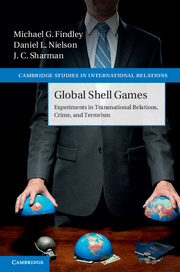Book contents
- Frontmatter
- Dedication
- Contents
- List of Figures
- List of Tables
- Preface
- 1 Introduction
- 2 Explaining the global shell game
- 3 Overall compliance, tax havens, OECD and developing countries
- 4 Terrorism and corruption
- 5 Laws and standards
- 6 Penalties, norms, and US origin
- 7 Conclusion
- Appendices
- References
- Index
5 - Laws and standards
Published online by Cambridge University Press: 05 June 2014
- Frontmatter
- Dedication
- Contents
- List of Figures
- List of Tables
- Preface
- 1 Introduction
- 2 Explaining the global shell game
- 3 Overall compliance, tax havens, OECD and developing countries
- 4 Terrorism and corruption
- 5 Laws and standards
- 6 Penalties, norms, and US origin
- 7 Conclusion
- Appendices
- References
- Index
Summary
In June 2011 we sent a Placebo email from our Denmark alias, Mikkel Pedersen, to a service provider in Indiana. Shortly thereafter we received a response indicating that the information needed for incorporation was the name of the company, the “assumed” name of the company, the company address, the dissolution date (the provider recommended “perpetual”), whether the company would be managed by its members, and the name and address of the registered Indiana agent. The provider offered to serve as the agent for no additional charge. Finally, the provider complimented us on our English, praising it as “better than some Americans!” Nothing else was required save the payment by check or credit card. As per our protocol, we coded this response as non-compliant: the provider required no proof of identification for the beneficial owner. This type of non-compliant response was quite common for our US subjects. Indeed, as noted earlier, more than 40 percent of providers replying to our inquiries in the United States required no photo identification documents whatsoever.
But a curious thing happened with the same firm in May 2012, when we sent a second inquiry. The email came from the Norwegian alias, Lukas Hansen, and it was equivalent to the first email save for one additional sentence, which read, “My internet searches show that United States law, enforced by the Internal Revenue Service, requires disclosure of identifying information when forming a company.” How did our genial service provider so complimentary of our English skills react? We received no response, even after we pestered with two follow-up emails.
- Type
- Chapter
- Information
- Global Shell GamesExperiments in Transnational Relations, Crime, and Terrorism, pp. 116 - 144Publisher: Cambridge University PressPrint publication year: 2014



